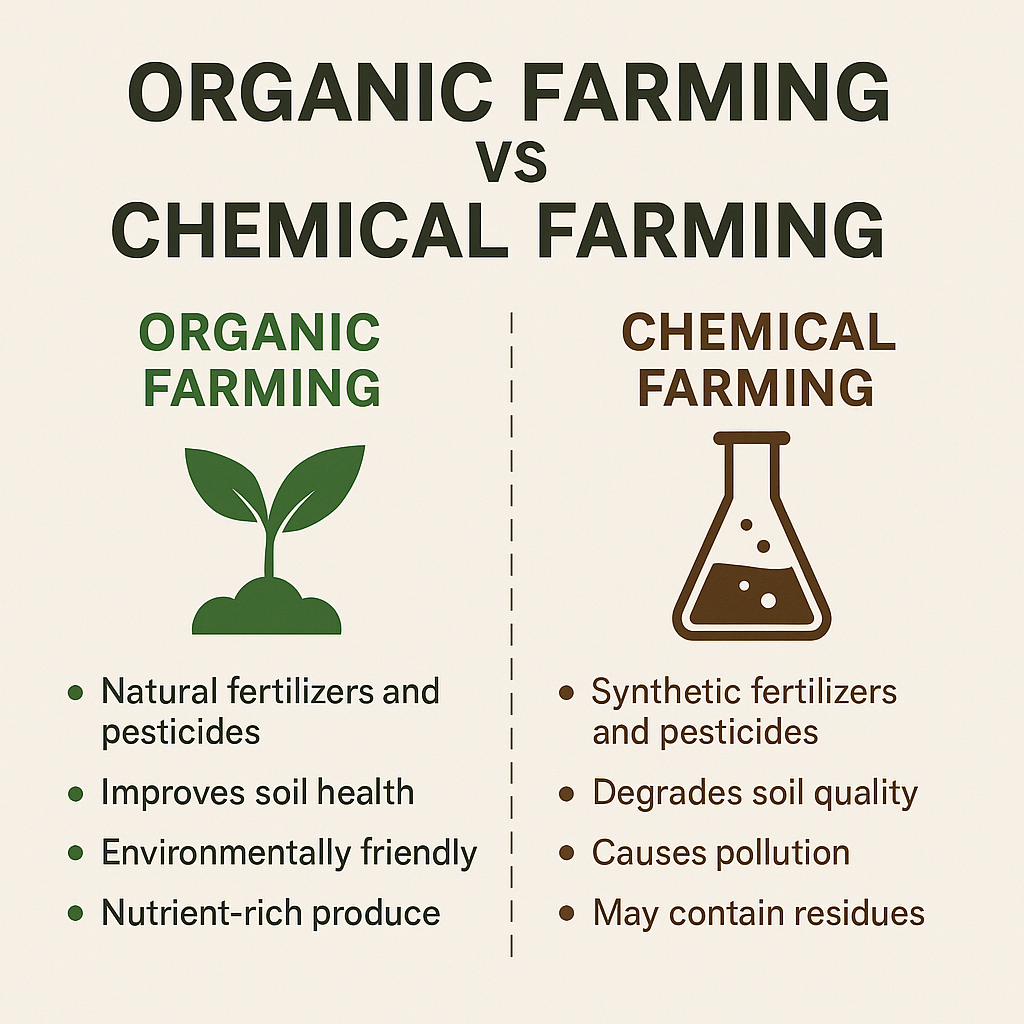
What Is Organic Farming?
Organic farming is a method of agriculture organic farming that emphasizes natural processes over synthetic inputs. It avoids chemical fertilizers, pesticides, and genetically modified seeds, focusing instead on compost, manure, and biological pest control. The goal is to maintain soil fertility, promote biodiversity, and ensure organic food production that is both safe and sustainable. This eco-friendly approach not only nurtures the environment but also improves the quality and taste of food.
What Is Chemical Farming?
Chemical farming is a conventional agricultural method that relies on synthetic fertilizers, pesticides, and herbicides to increase yield and control pests. While it helps produce large quantities of crops in a short time, it can harm the environment, reduce soil fertility, and leave chemical residues in food. Over time, the heavy use of chemicals leads to soil degradation, water pollution, and health concerns, making it less sustainable in the long run.
Key Differences Between Organic and Chemical Farming
|
Natural Farming or Jaivik Kheti
Natural farming or jaivik kheti focus on using resources available on the farm itself. These systems rely on organic materials like cow dung, green manure, and crop residues to enrich the soil. Such methods encourage self-sufficiency, minimize external inputs, and improve the resilience of farming systems. Farmers practicing organic kheti have found that over time, their soil becomes healthier, water retention improves, and crops become naturally resistant to pests.
Organic Cultivation and Plantation
Organic cultivation applies to all types of crops vegetables, grains, fruits, and even plantation crops like tea, coffee, and spices. In organic plantation farming, natural compost, mulching, and biological pest control are key practices. By avoiding synthetic inputs, farmers maintain the ecological balance and protect the health of both the environment and consumers. Organic agriculture ensures that every stage from soil preparation to harvesting follows nature’s rhythm.
Green Farming and Sustainable Practices
Green farming refers to environmentally responsible agricultural practices that reduce pollution and conserve natural resources. It includes methods like solar-powered irrigation, rainwater harvesting, crop rotation, and natural pest control. By combining innovation with sustainability, green farming supports climate-friendly agriculture that benefits both the planet and the farmer.
Types of Organic Farming
There are different types of organic farming depending on the region, climate, and crop type. The main categories include:
These systems help create a circular economy in agriculture where waste becomes a resource, and nature’s balance is maintained.
Benefits of Organic Farming Over Chemical Farming
Organic Food Production: Health and Consumer Demand
With rising awareness about health and sustainability, organic food production is expanding worldwide. Consumers are willing to pay a premium for products grown without harmful chemicals. This demand encourages farmers to adopt organic cultivation methods that focus on food safety, nutrition, and environmental well-being.
Challenges in Organic Agriculture
Despite its benefits, organic agriculture faces a few challenges:
However, as technology and awareness grow, these challenges are being addressed through research, policy support, and farmer training programs.
The Future of Farming
The future of agriculture lies in blending the wisdom of natural farming with modern science. Organic kheti, green farming, and organic agriculture are not just alternatives—they are the way forward for food security, soil health, and environmental sustainability. By choosing organic cultivation, farmers and consumers contribute to a cleaner, greener, and healthier world.
Frequently Asked Questions (FAQs)
Organic farming is more than just a method it’s a philosophy that values harmony with nature. While chemical farming focuses on quick results, its environmental cost is high. In contrast, organic agriculture, natural farming, and jaivik kheti promote long-term sustainability, soil fertility, and human health.
The shift toward green farming and organic cultivation represents a positive step toward building a resilient agricultural future that benefits both people and the planet.
Copyright © 2025 Magar Natural Food | All Rights Reserved